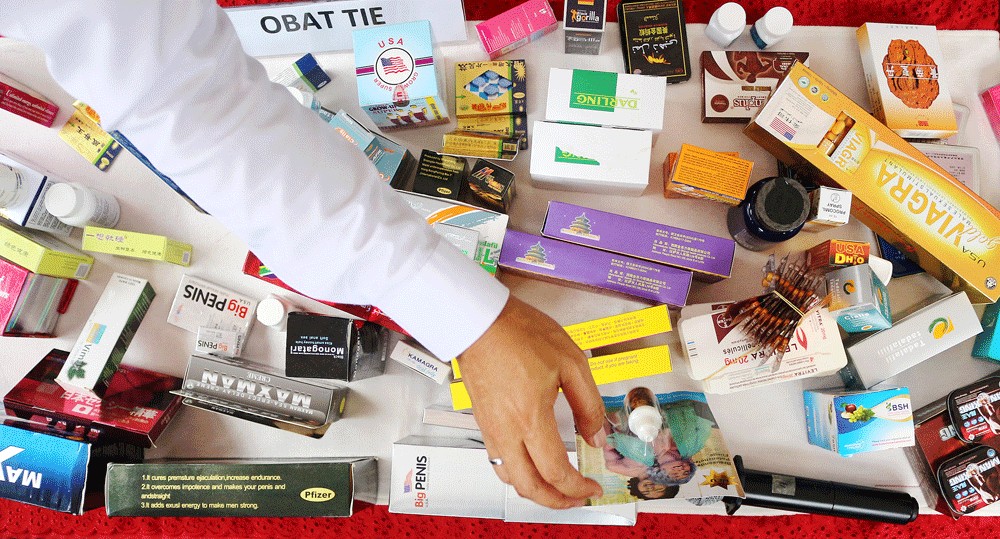Popular Reads
Top Results
Can't find what you're looking for?
View all search resultsPopular Reads
Top Results
Can't find what you're looking for?
View all search resultsImprisonment does more harm than good for drug users
Sentencing people who use drugs but commit no crimes that endanger others is inappropriate and ineffective, because they continue using drugs in prisons.
Change text size
Gift Premium Articles
to Anyone
T
he arrest of transgender celebrity Lucinta Luna on Feb. 11 for using drugs has attracted nationwide attention mainly because of the debate about whether Luna should be sent to a male or female prison. A more important question is whether drug users need to be criminally punished and whether imprisonment is an effective deterrent to drug abuse.
Indonesia is the largest market for drugs in Southeast Asia, with 80 percent of drugs entering the country passing through its vulnerable coastlines. Indonesia is also a strategic transit country for international drug trafficking because of its location between the Golden Triangle (Laos, Thailand and Myanmar) and neighboring drug markets, such as Australia.
Since drug control became prominent in Indonesia’s national agenda in the 1970s, Indonesian drug laws stipulate severe punishment for the supply or use of banned drugs, including the death penalty for certain drug trafficking offenses.
Because drug use is regarded a problem of crime and morality in Indonesia, there is extensive support from society and the state for a harsh law enforcement approach. As a result, Indonesia’s drug policy emphasizes a punitive approach, even though this has earned the country wide criticism for its human rights violations. Law No. 35/ 2009 on narcotics maintains the criminalization of drug use with a maximum penalty of death and makes little distinction between drug traffickers and drug users.
In addition, the definition of “addiction” used by the National Narcotics Agency (BNN) is problematic. The use of the terms “experimental user”, “regular user” and “non-needle-based addict” can be confusing. Someone who has injected themselves with a narcotic substance once in the past year can be considered a needle-based addict.
Only very few prisons in the country are specifically designated for drug offenders. As a result, people who use drugs are spread out across other prisons and cannot be easily identified. Overcrowded prisons are associated with poor ventilation, sanitation and nutrition. When combined with the common availability of drugs in prison, they create a high-risk zone for the spread of HIV, tuberculosis and hepatitis C. Reports are rampant regarding police mistreatment and abuse of drug users in prisons, with drug users subjected to strangling, beating, sexual violence and electrocution.
Sentencing people who use drugs but who do not commit crimes that are dangerous for society is inappropriate and ineffective, because they continue to use drugs in prison. Based on a report from the Indonesian Drug Victim Advocacy Brotherhood (PKNI), different kinds of drugs can be easily bought from the police in prisons, but not injection kits. Although the Narcotics Law authorizes judges to impose drug dependence treatment or rehabilitation instead of imprisonment (Article 103), many judges have been reluctant to use this discretionary power, because of lack of awareness.
The Narcotics Law also authorizes forced rehabilitation of those arrested or reported for drug abuse and assessed as addicted (Articles 54, 55, 103, and 127). However, according to the United Nations Office on Drugs and Crime (UNODC), forced rehabilitation has minimal therapeutic effect. It is expensive and does not benefit the drug user nor the community and is also considered a breach of international human rights agreements and ethical medical standards.
Medical and social rehabilitation programs are available, and many are supported by the government, but the government’s main approach to drugs seems to be punishment. This punitive approach may deter drug users in Indonesia from obtaining appropriate harm reduction services and force them to hide their drug use and the resulting problems from their families and friends.
The issue of drug abuse in medical discourse is also often viewed though a evaluative gaze in hierarchical dichotomies such as disease/health, natural/chemical, normal/abnormal and order/disorder. In reality, there is a complexity in the relationship and interaction between the body and things; therefore, understanding drugged bodies and what keeps them attached to drugs is important in treating drug addicts.
The government’s punitive approach and the lack of a more objective framework on drugs and drug use have created barriers for drug users to access more humane drug dependence treatment.
Imprisonment doesn’t reduce drug use, as the number of drug users in Indonesia continues to rise according to the BNN. Rather than being thrown into prison, drug users should be offered appropriate treatment that focuses on how people can make practical choices regarding safety and care. This may offer better prospects for the future of drug users and society.
***
The writer graduated from the School of Philosophical and Historical Inquiry, University of Sydney. She works at the Centre for International Language and Cultural Studies, Universitas Islam Indonesia, Yogyakarta.










